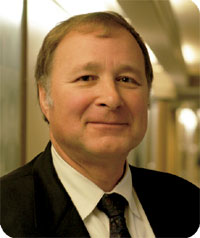

by Julie Garner
PATCH WORK
In 1978 when E. Patchen "Patch" Dellinger performed his first bariatric surgery, one of the first in Washington state, the patient weighed more than 600 pounds and the surgery was viewed with suspicion by most of his medical colleagues. Times sure have changed. In November the New York Times reported that more than 100,000 morbidly obese Americans underwent some form of bariatric surgery, or gastric bypass, in the last 11 months-four times as many as in 1998.
At the time, Dellinger was working as a trauma surgeon at Harborview Medical Center, but wanted to have a relationship with patients beyond emergency care. He decided to pursue bariatric surgery because no one was serving morbidly obese patients. But the surgery was so rare then that very few surgeons knew how to do it.
"I went to the University of Iowa and watched what they were doing. And I learned on the job," he says. One of the things Dellinger has learned is that when a person hits 400-plus pounds, even with gastric bypass surgery, dietary modifications and exercise, it is unlikely that normal weight will ever be achieved. He is very frank with his patients about the surgery's limits.

"One of the first things I tell them is, 'This operation does not cause weight loss. Diet and exercise cause weight loss and the operation assists dieting,' " he says. Even though there is no silver bullet, many obese patients are wait-listed for the surgery at the UW because they are so desperate for change.
After 25 years of performing bariatric surgery, Dellinger speaks with passion about what these patients endure. "Some people are so heavy they can't stand up. They're in wheelchairs because of their weight. We get people who can barely breathe. Some don't leave their homes because they are too embarrassed," he says. "Obese people in the United States are one of the last groups of people about whom most people make uncensored rude remarks."
Dellinger points out that accommodations have to be made in order to care for obese patients properly. Obese patients often can't sit on a hospital toilet without breaking it. They're too heavy to have surgery on a regular operating table because it won't sustain their weight. Often X-rays and MRI images are inadequate because the technology can't "see" past the fat. Some regular surgical instruments don't work because they're not long enough.
The UW Medical Center has taken steps to improve services to patients who are obese. Equipment is being upgraded, nursing unit rooms are being remodeled so obese patients can get through widened doorways and new beds are more comfortable.
As the UW's "father of bariatric surgery," Dellinger believes the day will come when the super obese no longer need surgery and hospitalization. "We are going to learn how to help these people," he says, "It will come."
—Julie Garner
Go To: Page 1 | Page 2 | Page 3
Sidebar: Patch Work: Stomach Bypass Pioneer Dr. "Patch" Dellinger